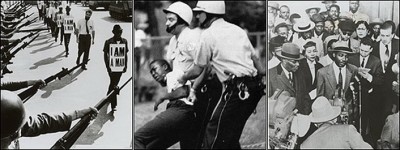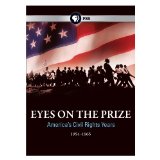| Reviews & Columns |
|
Reviews DVD TV on DVD Blu-ray 4K UHD International DVDs In Theaters Reviews by Studio Video Games Features Collector Series DVDs Easter Egg Database Interviews DVD Talk Radio Feature Articles Columns Anime Talk DVD Savant Horror DVDs The M.O.D. Squad Art House HD Talk Silent DVD
|
DVD Talk Forum |
|
|
| Resources |
|
DVD Price Search Customer Service #'s RCE Info Links |
|
Columns
|
|
|
Eyes on The Prize: America's Civil Rights Years 1954-1965
For most of the last 15 years Eyes on the Prize has been out of circulation due to rights issues; the licenses on certain clips and possibly some music had expired, precluding a commercial DVD release. But so significant is the program that money was eventually raised to reacquire all those expired rights and restore the six-hour, six-part series.
The program is divided into six episodes running just under an hour, though they seem to have originally aired as three two-hour blocks: the odd-numbered episodes have no end credits at all. These well-organized shows tend to focus on two major developments per hour. These are the highlights:
Episode One: Awakenings: The murder of Emmett Till; segregated busing, Rosa Parks, and the boycott begun by King and the Southern Christian Leadership Conference (SCLC).
Episode Two: Fighting Back: School integration at Little Rock Central High School and the University of Mississippi.
Episode Three: Ain't Scared of Your Jails: Lunch counter sit-ins, the formation of the Student Nonviolent Coordinating Committee (SNCC), and their subsequent "Freedom Rides."
Episode Four: No Easy Walk: Anti-segregation campaign in Albany, Georgia, the Children's March in Birmingham, Alabama, and the March on Washington, D.C.
Episode Five: Mississippi - Is This America?: The murder of Medgar Evers and three civil rights volunteers; Freedom Summer; the Civil Rights Act.
Episode Six: Bridge to Freedom: The march from Selma to Montgomery and the Voting Rights Act of 1965
Most importantly, Eyes on the Prize serves as an urgent reminder of the widespread, blatant injustices and out-in-the-open racial hatred that existed in the United States less than 50 years ago. There's an eerie timeliness in the DVD's release, in a month marked by Arizona's "Papers, Please" anti-immigration legislation; the Texas State Board of Education's Soviet-style let's-change-the-history-books textbook revisions, including the struggle for civil rights; to Tea Party Kentucky Senate candidate Rand Paul's assertion that privately-owned businesses should be allowed to refuse black customers after all.
A large part of Eyes on the Prize's effectiveness is its impressive balance, refusing to look at the fight through the rose-colored lenses of nostalgia. One episode focuses on a major miscalculation on the part of Dr. King, and throughout he's regarded as an effective fund-raiser, orator, and symbol of the movement, but largely absent from the front lines. The series also discusses in detail how the coalition between SCLC and SNCC began to unravel as preparations were being made for the march from Selma to Montgomery, and how their discord in turn gave rise to the Black Panthers and other more violent and militant groups. (The even better Eyes on the Prize II, which one hopes will also be released to DVD soon, covers the years that followed.)
It also makes plain that in large part the struggle was spurred because the federal government, through the Eisenhower, Kennedy, and Johnson administrations, were loathe to enforce federal laws designed to protect African-Americans while state and local governments simply but steadfastly ignored them and refused to comply, thus forcing the activists' hand.
But, as the saying goes, a picture is worth a thousand words, and the television news images of nonviolent protesters, many of them ministers, teachers, and students, being gassed or beaten with nightsticks in plain sight was as appalling a sight then as now. Even more shocking is the casual racism of local politicians and law enforcement officers as they try to rally local support for their pro-segregation views at the expense of the national audience. ("Dr. Martin Luther Coon...er, King," says one such mayor at a televised press conference.) Many of the key pro-segregation figures are also interviewed for Eyes on the Prize and nearly all are unrepentant, 25 years later.
This is also the type of documentary series as tense, exciting, tragic and uplifting as the best fiction films. The bravery of Emmett Till's mother at insisting upon an open casket for her son, so that mourners could see how horribly mutilated her boy's body had been; the day-to-day tensions at the Little Rock high school, where nine black students faced a gauntlet of hatred outside and a mixture of compassion and racism from their classmate indoors. Each episode is as exciting as it is informative.
Video & Audio
Presented in its original full-frame format, Eyes on the Prize seems to have undergone some fairly extensive restoration. Some of the archival clips are still in rough shape, but most of the show looks great, and the mixture of new interviews (shot on film), archival material in 16mm and something resembling kinescope come off well. The English stereo mix is also nice, and the program is closed-captioned.
Extra Features.
The lone extra is an archival interview with series creator and executive producer Henry Hampton, who died in 1998.
Parting Thoughts
Simply put, this is one of the best DVD releases of this or any other year. This is one that belongs in every DVD collection and thus is a DVD Talk Collector Series title.
Stuart Galbraith IV's latest audio commentary, for AnimEigo's Musashi Miyamoto DVD boxed set, is on sale now.
|
| Popular Reviews |
| Sponsored Links |
|
|
| Sponsored Links |
|
|
| Release List | Reviews | Shop | Newsletter | Forum | DVD Giveaways | Blu-Ray | Advertise |
|
Copyright 2024 DVDTalk.com All Rights Reserved. Legal Info, Privacy Policy, Terms of Use,
Manage Preferences,
Your Privacy Choices | |||||||















